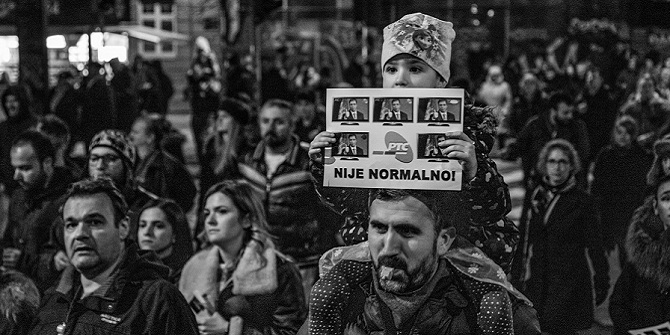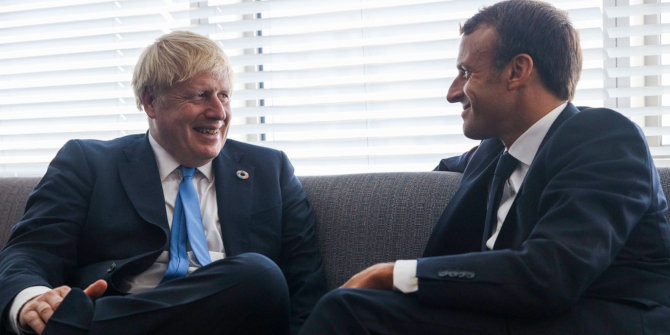 The European Council is expected to confirm that ‘sufficient progress’ has been made on the opening set of Brexit negotiations when it meets on Friday. Simon Usherwood previews the European Council meeting, noting that the optimism which greeted the breakthrough agreement reached on 8 December has been undermined by the reaction to comments from David Davis at the weekend.
The European Council is expected to confirm that ‘sufficient progress’ has been made on the opening set of Brexit negotiations when it meets on Friday. Simon Usherwood previews the European Council meeting, noting that the optimism which greeted the breakthrough agreement reached on 8 December has been undermined by the reaction to comments from David Davis at the weekend.

Credit: European Council (CC BY-NC-ND 2.0)
One of the great perils of the future is that it hasn’t happened yet. Two weeks ago, the outlook for the European Council to be held on Friday to discuss progress on the UK’s withdrawal negotiations was very bleak, and the smart money would have been on a decision to further delay opening the second phase.
But last Friday’s breakthrough – after a false start earlier in the week – turned that around, to the point that this piece would have had nothing to say, beyond the conclusion that the European Council would just be a rubber-stamping exercise by the EU’s member states.
However, following Sunday morning’s round of interviews by leading government figures, things look to be much more open once more. In particular, David Davis’s assertation that the deal with the Commission wasn’t binding – a statement he swiftly rowed back on – raised a lot of concern in national capitals about the UK’s commitment to the process. What should have been a simple bit of procedure has thus turned into a serious point of debate for all involved, and what happens on Friday will have marked consequences. There are three points to watch on this.
When does Phase II start?
There’s no serious doubt that the European Council will confirm that ‘sufficient progress’ has been made on the opening set of negotiations. The Joint Report from the UK and the Commission, and the latter’s own communication, both state that the Commission is satisfied with what has been achieved, and the European Parliament has also agreed.
An agreement on citizens’ rights, finances and the Irish border was the pre-requisite for the EU27 to allow talks to move to Phase II, which will cover the establishment of a framework for negotiations on a new future relationship – to begin post-withdrawal – and the arrangements for the interim period between withdrawal and the new relationship starting.
However, the Davis scare has produced much debate in the EU about whether the UK should be allowed to start Phase II immediately. Several reports from Brussels suggest that there is now a move to waiting until February or March to begin substantive talks, with the intervening time being used to firm up the EU’s negotiating mandate (and also to underline the displeasure with Davis’ language).
However, this is not yet fixed, and the EU27 have the capacity to move much more quickly, especially since they got the ball rolling on the mandate back at their October meeting. The degree to which they decide to delay will therefore reflect the balance between wanting to make progress towards a final deal and showing the UK that this is something to be taken seriously: as much as Davis’ comments have irked, many will worry that time is already very tight and any further loss would derail the entire process, to no-one’s benefit.
Does the European Parliament become more visible?
So far, the European Parliament has been something of a silent partner. Its concerns about citizens’ rights were taken on board at the start of the Article 50 process and it has largely reserved itself to reminding everyone that it too has to approve the final text. The tension has been building, especially as the interim deal last week appeared more limited on citizens’ rights than on the other two topics: various concessions were made to the UK on existing citizens in the other’s territory, and there was almost nothing on future freedom of movement.
While the Parliament’s committee did sign off on the ‘sufficient progress’ statement, it has also been clear that they want to see more protection of existing rights and the avoidance of as many future barriers to movement as possible. Since freedom of movement is linked to the question of the new relationship, this would be an ideal opportunity for the Parliament to push harder on the topic.
This won’t be reflected directly in the European Council’s conclusions, since the Parliament isn’t a full participant, but the messaging from senior Parliament officials in the coming week – especially Guy Verhofstadt (the lead on Article 50), Antonio Tajani (Parliament President) and Manfred Weber (leader of the centre-right EPP grouping, the largest in Parliament) – will be a key marker of whether there is an intention to make more of their role.
What’s the reaction in the UK?
To listen to most of the UK media, the deal last week was it for deals. This impression wasn’t helped by Theresa May’s appearance in Parliament on Tuesday to give a statement, a practice that has usually only followed European Councils. While this has drawn some of the edge off the reaction from those critical of May’s approach, should the European Council decide to impose some conditions or delays on the process then it is very likely that debate will be rekindled.
In particular, an extended delay will give ammunition to both those who would leave without any deal and those would want a much closer relationship. The former will use it as evidence of the perfidy of the EU and the need to get away as quickly and as fully as possible. The latter will point to the need to maintain close and friendly relations, and to the need for effective controls by Parliament.
This last point will be crucial, as the Withdrawal Bill continues to be debated in Parliament: a nasty shock on Friday might bolster calls for further amendments (and thus government defeats). Although big movement is unlikely in British political debate, Friday’s European Council will have the effect of further embedding the provisional agreement as the basis of all future negotiation in Article 50: for those that reject that text, this is their last, best chance to change things.
Please read our comments policy before commenting.
Note: This article originally appeared at UK in a Changing Europe. It gives the views of the author, not the position of EUROPP – European Politics and Policy or the London School of Economics.
_________________________________
 Simon Usherwood – University of Surrey
Simon Usherwood – University of Surrey
Simon Usherwood is a Reader in Politics at the University of Surrey and a Research Investigator at UK in a Changing Europe.




